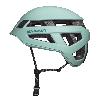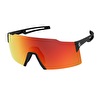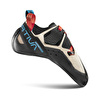'Osa, ma non troppo', Cerro Cota 2000 (Paine, Patagonia)

 1 / 26
1 / 26 arch. I 40 ruggenti
arch. I 40 ruggenti
From 21 - 26 January 2007 the Italians Elio Orlandi, Michele Cagol, Fabio Leoni and Rolando Larcher made the first ascent of "Osa ma non troppo", a 700m line up the East Face of Cerro Cota 2000 (Torres del Paine, Patagonia). The so-called "Roaring 40ers" - any clear reference to their age fully intended - climbed the beautiful line up the 700m granite face which resembles, due to the beauty and rock quality, El Capitan in Yosemite. The four reached the summit after 5 nights and 6 days on the wall during which they endured sun, wind, thick mist and a heavy downpour which forced them to stay put in their portaledges for 36 long hours... A full-blown Patagonian adventure therefore…
As with all adventures they could have backed off, postponed it to another date, or simply thought that the time, just like their age, wasn’t right… But perhaps because they’re in their roaring 40’s, or perhaps because that all-important expedition alchemy was in the air, or perhaps because the four have known each other since childhood – perhaps because all of this, plus that little bit of luck they all were “owed”, meant they managed to create this route. A 700m line, climbed 85% free (max difficulties 7b, oblig 7a) and the rest via aid (max A2+) up this fantastic granite face, with some pitches described as being “simply a dream”. The name of the route? “Osa ma non troppo” – Dare, but don’t exaggerate! The name is a great indication of what lies in store…
OSA, MA NON TROPPO - Cerro Cota 2000 East Face
Torres del Paine National Park - Chile
text and photos "I 40 ruggenti"
It's the same old story… an evening with friends, a couple of photos, a few beers and then, whilst driving back home, more talk about those photos. The next day all four of us are talking about it... so why not go for it? Come on, at the end of the day all we need is a month, and that face is crying out to be climbed: yes, tomorrow we'll find out about the air tickets!
And so in less than two days we’re in Patagonia. Well, in our thoughts at least. In the travel agency the woman behind the counter reminds us of our age and suggests more exotic destinations: but most of us have “just ticked” the 40’s mark and one of us is “just over” 50! A quick glance at the brochure with its sun blessed beaches and curves and… we remain faithful to our belief.
The roaring 40’s are off. Or rather, our main pillar is already there, trudging up the glacier with his megaprojec. Low key, modest, but with one great companion: without great technological means and precise weather forecasts he trudges up and down the Patagonian glaciers for more than a month, relaxed and smiling, adding an important brick to this imaginary line which, slowly but surely, we too begin to make out: well done Elio Orlandi! He’s a mountain guide and a true Patagonian climber, one of those who leaves the cushy beaches around Chalten’s mountains, comprised of pubs and restaurants, comfortable rooms and hot showers. His home is the Patagonia as it once used to be, a simple hole in the glacier, a stone’s throw from the wall, with his friend Fabio Giacomelli; he needs nothing more. If the sun doesn’t shine then he’ll attempt the route in bad weather and otherwise, calmly, “otra vez…”
Rolando Larcher is an Italian Alpine Club academic, policeman and famous Trentino mountaineer. Long ago he decided to take his technique and tenacity to some of the world's hardest faces, and he’s the driving force behind this project. A few years ago he travelled to Patagonia but, after a month of uninterrupted storms, he decided never to return again. We, his adventure companions, were sure though he’d return.
And these are the remaining two: Fabio Leoni from Pietramurata (close to Arco), Italian Alpine Club academic, a myriad of first ascents on mountains throughout the world, driven by power and passion. And Michele Cagol, a recent Italian Alpine Club academic, the nostalgic one who, after 20 years absence, now returns to Patagonia. Both left their Vertical World Sport shop in the able hands of those who work for them and off they went for a month of fresh air. What can be said? Let's give luck a go, we’re ready!
But how things change... once we were preoccupied with the rock faces, about what awaited us down there, about the cold and the storms. But now the true difficulties lie elsewhere, are about leaving home and our families, partners and children - forced to wait for our self-centeredness, for our vertical projects. But we’re lucky, they understand and we depart serene and emotionally highly charged.
And how Patagonia has changed! No more never-ending walk-ins, perhaps with ox or horses who for days had to transport all the gear to base camp. Now there are porters and in less than a day we’re at the head of our dream valley, in the heart of the “French valley” in the Paine National Park.
This National Park is one of the world’s foremost trekking destinations, resulting in an incredible influx of people; 120,000 during the time we were there, compared to months of complete solitude at the end of the ‘80’s and start of the ‘90’s. So what has become of the legendary, austere Patagonia described by so many as being a hellish land with a merciless climate? All we need is a bit of imagination and, walking just that little bit further, we rediscover the dimension we treasured. Just off the tourist’s beaten track one can still breathe a climate made of rucksacks and glacial moraines, of yo-yoing up and down due to the bizarre climate, of victories and of giving up, and of unique moments shared with the best of friends; inseparable climbing companions.
Seven days after departing, Elio, Fabio, Michele and Rolando are already there, getting to grips with the oceanic granite of Cerro Cota 2000. The face resembles "El Capitan" in California, but it’s almost unknown in Patagonia and, importantly, it’s been breached by only two other routes.
A rock face, a group of friends and, if you look carefully, a pretty severe objective. Or rather, a really severe objective, even without bearing in mind that we have to haul everything, including water, up the totally vertical 700m face. What’s more there isn't even an outline of a terrace, or small snow-filled ledge. Nothing at all! Although it snows, nothing sticks. So what next?
On 21 January we’re on the wall with our portaledges, we haul food, 40 liters of water and a great deal of equipment. The climate is bizarre: sun in the morning gives way to showers in the afternoon, then to storms (with lightening, almost unheard of in Patagonia), high winds and then, finally, peace and quiet in the evening. We crawl into our tents and with 400m beneath our “mattresses” we fall asleep, waiting snug and content for the next morning. But hadn’t we just said peace and quiet? That night it rained so hard that our tents were put to an extreme test and, after 24 hours of continuous downpour, we find our tents flooded, it was like sleeping in a swimming pool!
Immediate evacuation! We’re soaked to the bone and frozen solid, and we need to wring our sleeping bags and clothes dry. We look each other in the eye: but if tourists walk for hours in this downpour and these high winds, then surely veterans like us shouldn’t complain? But nobody would see us here, we could descend, dry out, get our energy back and climb up again. But our spirit is different: we shift around here and there and a day and a half later the first rays of sun return once more.
The best present ever down there... two hours of sun in the morning dry us out and then, like true hardmen depicted in the magazines, we start to climb again. We kick off at 11.00 am, up the first two pitches of the day. These, the ninth and tenth on the route, turn out to be best on the entire line thanks to their difficulty and beauty. Two pitches worth the entire sacrifice of the expedition. We relish the pleasure of climbing a superb 50m flake in just a T-shirt, and then finding a tiny but comfortable half a square meter “cap spire” belay
A demanding, unknown and surprising next pitch turns out to be the crux. We called it “Changing dihedral” and this led from a series of corners to a direct and beautiful pitch to the right. From below this featureless, overhanging changeover looked like a strong contender for plenty of aid but, almost without hoping, we managed to free it – with a bit of courage and hard obligatory climbing. The route then continues up dreamlike granite and, after 5 nights and 6 days of sun, rain, wind and mist we reach the top of our summit. No conquest, but a sweet taste to savour. A series of hugs and smile, plenty of photos, glances which share the success of such a difficult and beautiful climb.
Only the name was missing. We called it "Osa ma non troppo", roughly translated as "dare, but don’t exaggerate". Perhaps this sounds strange or is a bit presumptuous, but we really liked it… And in the end we were undecided between this and another name, equally interesting and very up-to-date: “The sense of of it all”. Well!?! Quien sabe!
The roaring 40’s...
EXPEDITION MEMBERS "I 40 RUGGENTI"
Elio Orlandi, Mountain Guide, lives in San Lorenzo, veteran Patagonian cliomber with many first ascents, including “Linea d’eleganza” on Fitz Roy, candidate for the Piolet d’Or 2005.
Michele Cagol, Italian Alpine Club Academic, lives in Mattarello, co-owner of Vertical World Sport. Third Patagonian expedition, second new route.
Fabio Leoni, Italian Alpine Club Academic, lives in Pergine, co-owner of Vertical World Sport. Tenth Patagonian expedition with many new routes around Arco and in the greater ranges, from Baffin to Alaska.
Rolando Larcher, Italian Alpine Club Academic, lives in Mattarello, policeman in Trento. Second Patagonian expedition, has numerous first ascents in Morocco, Madagascar, Messico and Turkey.
The route
OSA, MA NON TROPPO
Cerro Cota 2000 East Face
Torres del Paine National Park - Chile
New route ascended capsule style from 21 - 26 January 2007
F.A.: Elio Orlandi, Michele Cagol, Fabio Leoni, Rolando Larcher
Length: 700m
Grade max free: 7b
Grade max aid: A2+
Grade obligatory: 7a
Gear for a repeat: 1 set of wires, 2 sets of Camalot to nr°4, triple sets from nr°0.5 to 2, 2 sets of microfriends. All belays are equipped. All pegs placed during the ascent were left in-situ. 2-3 people can bivy at belay 7 without a portaledge.
Note: The granite turned out to be fantastic, solid for 95% of the time, ideal for climbing free. We managed to climb 85% of our 700m route free. Steep walls with edges, cracks, flakes and super corners to be liebacked, plus the occasional severe obligatory sections resulted in a beautiful and interesting route, in the lee of the wind. We highly recommend a repeat. With a bit of lucky weather and drier cracks we think the route can be climbed free except for the 3rd pitch.
Download the route topo
Thanks to the following for the equipment:
Prosaccheria Ravelli di Trento, La Sportiva, Kong,
The North Face per Rolando Larcher,
Salewa per Fabio Leoni e Michele Cagol,
Montura per Elio Orlandi
| News archive Rolando Larcher | |
| News archive Elio Orlandi | |
| News archive Fabio Leoni | |
| verticalsport.it | |
| montura.it | |
| salewa.it | |
| La Sportiva Expo | |
| The North Face Expo |



 Copia link
Copia link





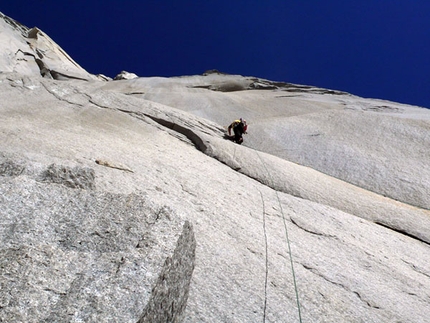






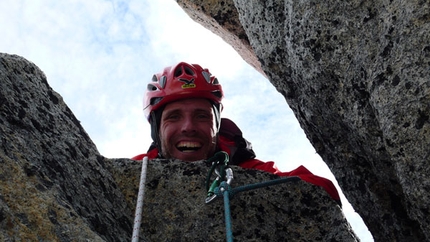

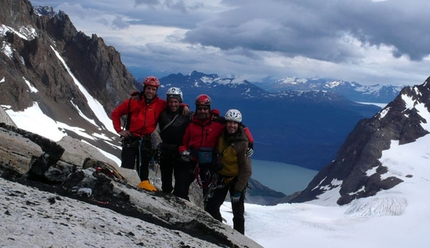
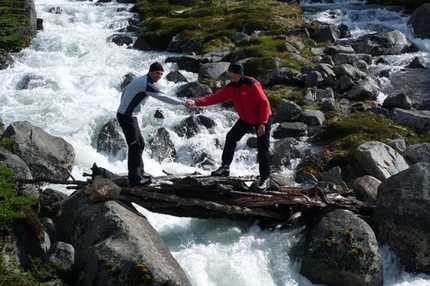
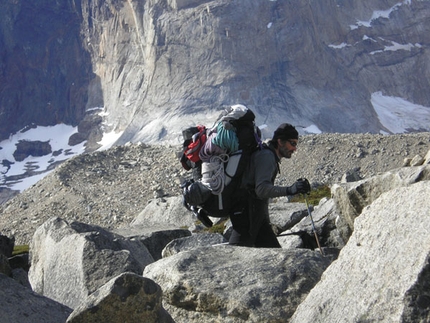
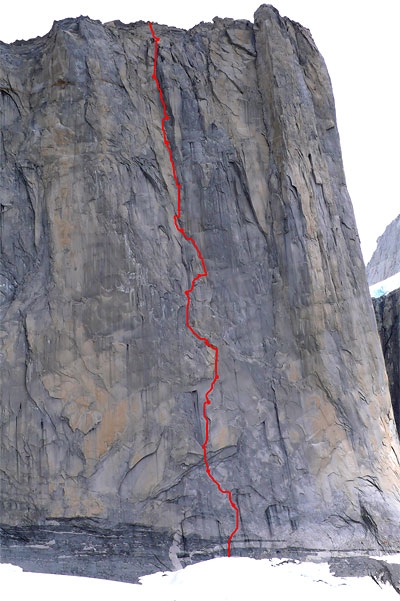

 See all photos
See all photos











